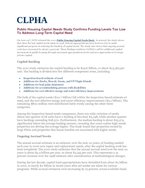Found 16 resources.
1
0
0
The Administration for Community Living’s Aging and Disability Network is a multifaceted service infrastructure for older adults and people with disabilities so they can find housing and obtain services like chore assistance, delivered meals, and transportation. By partnering with this community infrastructure, PHAs can improve voucher utilization and leverage and align resources so older adults, people with disabilities, and people experiencing homelessness —all priority populations for federal housing assistance—can obtain supportive services needed to attain housing stability, optimize...
Topics: Advocacy, Community development, Disabilities, Health, Housing, Partnerships, Research, Seniors, Supportive housing, Sustainability
 Shared by Karina George
on Jun 17, 2022
Shared by Karina George
on Jun 17, 2022 0
0
0

Trends in Housing Assistance and Who it Serves
Topics: Community development, Disabilities, Education, Funding, Health, Homelessness, Housing, Legislation & Policy, Low-income, Partnerships, Research, Seniors, Workforce development, Youth
 Shared by Keely Stater
on Sep 10, 2019
Shared by Keely Stater
on Sep 10, 2019 0
0
0
Serious mental illness (SMI) is a disabling condition that develops early in life and imposes substantial economic burden. There is a growing belief that early intervention for SMI has lifelong benefits for patients. However, assessing the cost-effectiveness of early intervention efforts is hampered by a lack of evidence on the long-term benefits. We addressed this by using a dynamic microsimulation model to estimate the lifetime burden of SMI for those diagnosed by age twenty-five.
Topics: Disabilities, Education, Low-income, Mental health, Research
 Shared by Housing Is
on Apr 23, 2019
Shared by Housing Is
on Apr 23, 2019 0
0
0

High-need, high-cost (HNHC) individuals are defined as people of all ages living with clinically complex needs and functional limitations who also incur high health care costs or are likely to do so in the near future. Despite frequent contact with the health care system and substantial medical spending, the physical, social, and behavioral health needs of these individuals often remain unmet due to uncoordinated and fragmented care. Studies suggest that HNHC individuals could benefit from a more holistic approach that coordinates the care they receive and addresses their unmet social needs....
Topics: Affordable Care Act, Disabilities, Health, Research, Seniors
 Shared by Housing Is
on Apr 11, 2019
Shared by Housing Is
on Apr 11, 2019 0
0
0
Because mental health conditions can negatively affect employment, people with these conditions make up a large share of federal disability program participants. Federal agencies have tested supported employment (SE) interventions designed to help those with mental health conditions keep or obtain employment and reduce their dependence on public programs. This brief describes the characteristics of adults with mental health conditions who participate in the federal disability programs and reports evidence from three recent studies of longer-term impacts of SE on the employment of people with...
Topics: Asset building, Disabilities, Mental health, Research, Workforce development
 Shared by Housing Is
on Mar 18, 2019
Shared by Housing Is
on Mar 18, 2019 0
0
0
The Supplemental Security Income (SSI) program is an important, means-tested source of income for the families of children with disabilities. Although some research has shown that SSI improves outcomes for these families, policymakers have been concerned about the program’s growth and the poor outcomes that many former child SSI recipients experience in adulthood. In this brief, we summarize research funded by SSA’s Disability Resource Consortium (DRC) on the program’s recent growth and the factors related to receipt of SSI by children. This research reveals dramatic variation in the rate of...
Topics: Child welfare, Disabilities, Health, Low-income, Research
 Shared by Housing Is
on Mar 18, 2019
Shared by Housing Is
on Mar 18, 2019 0
0
0
Housing is considered a social determinant of health, with poor housing conditions being associated with poor health. Veterans with disabilities are more likely to experience a housing crisis because of combat experiences and employment instability. We identified facilitators and barriers to finding and maintaining rental housing. We sought to understand the housing needs of Veterans with military-related disabilities using the biopsychoecological model (BEM) as an organizing framework.
Topics: Disabilities, Funding, Health, Homelessness, Housing, Legislation & Policy, Research, Safety, Seniors, Stability
 Shared by Housing Is
on Mar 14, 2019
Shared by Housing Is
on Mar 14, 2019 0
0
0
In response to the heightened interest in the relationship between work and the health of individuals and communities, CMCS has clarified that Medicaid funds cannot be used to pay beneficiaries’ wages, but can pay for employment counseling as an optional benefit—to help people get jobs. Years of experience with work requirements for the Supplemental Nutrition Assistance Program, Aid to Families with Dependent Children, and populations with disabilities have developed the evidence for what is needed to help different populations find and keep jobs.
Topics: Affordable Care Act, Disabilities, Health, Legislation & Policy, Low-income, Medicaid / Medicare, Research, Stability, Workforce development
0
0
0
Studies have consistently documented high rates of obesity and tobacco use among individuals with serious mental illness. In recent years, Medicaid programs have enrolled individuals with serious mental illness into managed care plans, which are responsible for ensuring that their members receive preventive care. Despite the movement to managed care, not much is known about whether this population receives routine screening and follow-up care for common comorbid health conditions and health behaviors.
Topics: Disabilities, Health, Low-income, Medicaid / Medicare, Mental health, Preventative care, Research
0
1
1
About 20 percent of adults in sheltered homeless families have a disability, compared with 9 percent of all US adults, yet few studies have addressed the intersection of disability and housing instability. A recent study explored the relationship between disabilities and Supplemental Security Income (SSI)/Social Security Disability Insurance (SSDI) income that homeless families reported when they entered emergency shelters, as well as later outcomes, such as housing stability, self-sufficiency, and food insecurity. It also examined how housing interventions affect SSI/SSDI income receipt.
Topics: Disabilities, Homelessness, Housing, Low-income, Research, Stability
0
0
0
Homelessness among children is correlated with developmental delays, fair or poor health, and high healthcare utilization. Associations of homelessness specifically among infants younger than 12 months, however, are unknown. This study evaluates homelessness during infancy as a risk for adverse infant and maternal health and hardship.
Topics: Child welfare, Depression, Disabilities, Dual-generation, Early childhood, Education, Family engagement, Food insecurity, Grade-level proficiency, Health, Homelessness, Housing, Low-income, Metrics, Partnerships, Pre-natal, Research, School-readiness, Youth
 Shared by Housing Is
on Aug 1, 2018
Shared by Housing Is
on Aug 1, 2018 0
0
0
We sought to learn more about how state- and locally funded rental
assistance programs were created, how they are structured, whom they serve, and how they are funded.
Topics: Cost effectiveness, Data sharing, Disabilities, Family engagement, Funding, Health, Homelessness, Housing, Legislation & Policy, Low-income, Partnerships, Research, Supportive housing
 Shared by Housing Is
on Aug 1, 2018
Shared by Housing Is
on Aug 1, 2018 0
0
0
Public Housing Capital Needs Study Confirms Funding Levels Too Low to Address Long-Term Capital Need
On June 24th, HUD released the 2010 Public Housing Capital Needs Study. In general, the study shows that since the last capital needs study in 1998, federal appropriations have been too low to make significant progress at reducing the backlog of capital needs. The study also shows that ongoing accrual costs have increased by about 15 percent. These findings reinforce CLPHA’s call for additional capital investment in public housing through increased appropriations levels and new approaches to leverage private capital.
Topics: Cost effectiveness, Disabilities, Energy, Funding, Lead, RAD, Research
 Shared by Housing Is
on Jul 27, 2018
Shared by Housing Is
on Jul 27, 2018 0
0
0
The link between federal housing policy and public health has been understood since the nineteenth century, when housing activists first sought to abolish slums and create healthful environments. This article describes how the Obama administration—building on these efforts and those that followed, including the Great Society programs of President Lyndon Johnson—has adopted a cross-sector approach that takes health considerations into account when formulating housing and community development policy. The federal Department of Housing and Urban Development fully embraces this “health in all...
Topics: Affordable Care Act, Community development, Disabilities, Health, Healthy homes, Housing, Legislation & Policy, Low-income, Mobility, Partnerships, Place-based, RAD, Research
 Shared by Housing Is
on Jul 19, 2018
Shared by Housing Is
on Jul 19, 2018 0
0
0
The South Lincoln Health Impact Assessment (HIA) focuses on the redevelopment master plan for the Denver Housing Authority’s South Lincoln Homes community in downtown Denver. The rapid HIA and masterplan was a four-month process that began in April 2009. The HIA identifies potential health impacts and recommends changes to optimize positive and minimize negative health consequences for the South Lincoln neighborhood. This assessment includes community demographic and socioeconomic information, identified potential health issues, interviews available surveys, and limited body measurement data...
Topics: Child welfare, Community development, Disabilities, Dual-generation, Health, Housing, Low-income, Mental health, Metrics, Nutrition, Preventative care, Research, Safety
 Shared by Housing Is
on Jul 17, 2018
Shared by Housing Is
on Jul 17, 2018 0
0
0
This article deconstructs the history, structure, and financing that have made this unique partnership between Philadelphia's Department of Behavioral Health and Intellectual Disabilities, the Office of Homeless Services, and the Housing Authority, possible.
Topics: Data sharing, Disabilities, Dual-eligibles, Health, Housing, Legislation & Policy, Low-income, Medicaid / Medicare, Mental health, Partnerships, Preventative care, Research, Supportive housing
 Shared by Housing Is
on Jul 12, 2018
Shared by Housing Is
on Jul 12, 2018 





